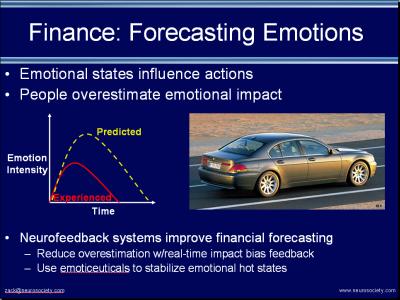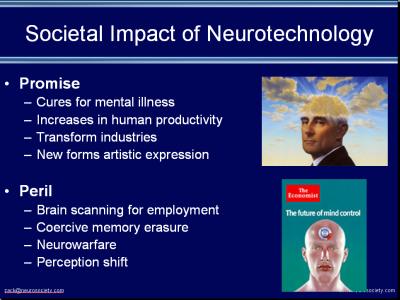Perception Shifting in Neurosociety: Ethical and Societal Implications
Zack Lynch
Page 4 of 5
As more people live longer, and the global competition intensifies, people will need to learn new skills throughout their lives, and continuously just to keep their jobs. Performance enhancing neurotechnology represents the tools workers will use to succeed in continuous education.
But using neurotechnology for performance enhancement will not come without protest. Cultural concerns regarding what is natural will lead to ethical and moral tensions around the basic right to augment oneself.
Divisions will emerge across all levels of society as humanity grapples with this new way of living; impacting each nation and culture differently. However, the reality is that we live in a highly connected global society. Even if it is just a small group of individuals who choose to improve their mental performance, their choice will transform the basis of business competition for the rest of us.
One of the first industries that will be impacted by neurotechnology will be finance. Today’s financial models are primarily based on the expectation that people are rational, economic actors however; as we all know, people are not always rational, economic actors.
Our emotional states influence our behavior. For example, we will make totally different decisions than when we are feeling safe than when we are feeling scared. In 2002, two economists won the Nobel Prize for their work that showed that individuals almost always overestimate the happiness, than an event like the purchase will bring, as well as the duration of that happiness.

Image 7: Finance: Forecasting Emotions
For example, we might believe that a new BMW will make life much better. It will actually likely be less exciting than the anticipated and will not excite for as long as we thought. So how will financial institutions use neurotechnology?
Neurotechnology enabled traders will have at least two new tools at their disposal. First, they will have real time brain scanning and neuro-feedback software solutions that correlate previous brain states and trading success to the given trader. It’s giving the trader a prediction capacity based on the continuously shifting neurobiology.
Think of your brain as a market of neurons matched up with the rest of the market economy. When the internal market matches up with the external market, you have a buy order.
Second, they might choose to use emotional stabilizers to maintain a calm state in intense financial transactions, representing the radical transformation of the prevailing view of managerial common sense for how to achieve the highest productivity in a financial organization and organize for the most profitable practices.
The authentic breakthroughs of the neurotechnology will unleash and alter cost structures throughout all industries in society, but like any new technology, neurotechnology is a double edged sword.

Image 8: Societal Impact of Neurotechnology
On the up side, it will represent new cures for mental illness, increasing human productivity, new opportunities for economic growth, and a potential flowering of artistic expression. These benefits, of course, are countered by the use of brain scanning as a requirement for employment, the testing of suspected criminals, even if they’re innocent, Coercive memory erasure or its use as neuro-weapons that can selectively erase the memories or shape the emotional state of individuals or even entire populations.